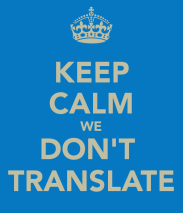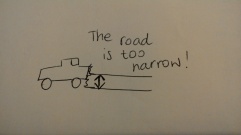 I always tell students that they shouldn’t translate into their native language. I say this mostly because in their study of the English language, learners are bound to bump into a word or phrase that, for a number of reasons (cultural, grammatical etc), they won’t be able to translate. Indeed, isn’t this but one of the many interesting aspects of learning a new language?
I always tell students that they shouldn’t translate into their native language. I say this mostly because in their study of the English language, learners are bound to bump into a word or phrase that, for a number of reasons (cultural, grammatical etc), they won’t be able to translate. Indeed, isn’t this but one of the many interesting aspects of learning a new language?
My suggestion is, rather than give in to the temptation of a quick translation, to instead use one of the following methods:
Learn by opposite
Learning pairs of opposite words (antonyms to use a fancy term!) is a clever way to broaden your vocabulary. When learning a new word, start getting into the habit of asking yourself what the opposite is . This method works best when studying adjectives. Examples:
empty – full
loud – quiet
wet – dry
Learn by synonyms
What I wrote about antonyms, it’s also true for synonyms (words that have a similar meaning). Here are some examples:
nice – lovely
smart – clever
sad – gloomy
D raw it
raw it
You might not be that good at drawing but I’m sure you are able to sketch a little something so that the meaning of a word will stick with you. What do you think of my drawing of the word ‘narrow’?
Make it personal
The other day a student didn’t know what the meaning of the word ‘thick’ was so I asked here whether she preferred her pizza thick or thin (I used my hands to explain the difference). She then wrote in her notepad ‘I like thick pizza‘ instead of a translation into Spanish, her mother tongue. She did the same with the word ‘handsome’:
My boyfriend is handsome.
This method works well with phrases too, for example to remember ‘I wish’ I’d write:
I wish I was a writer
The idea here is to make the sentence true for you. So if you’ve always wanted to be a singer you should write ‘I wish I was a singer‘.
Write an example (always)
I can’t stress this hard enough: you need to learn words in context. There is very little point in writing down a mere list of words. Make sure you always include collocations and examples (remember to make them personal, if possible). Look at these examples:
Breakfast (n)
to have/make/prepare/skip breakfast (collocations)
I usually have eggs for breakfast (example)
To climb (v)
to go climbing; to climb a mountain / wall (collocations)
I have never been climbing because I don’t like the mountains (example)
Now over to you, how do you get to remember new words when studying English?
Hope you’ve found these suggestions useful. If you have, please share them! 🙂